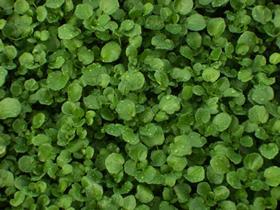
Salad and watercress grower Vitacress is funding a “groundbreaking” PhD to develop new varieties of more sustainable watercress.
Lauren Hibbert has received the backing of Vitacress to study at the Univsersity of Southampton and the University of California, Davis, and will work alongside Professor Gail Taylor, chair of Plant Sciences at UCD.
As a widespread crop, watercress has been tipped to play an important role in cultivating more sustainable and nutrient rich foods, particularly in developing countries, where more than 50 per cent of under five-year olds are iron deficient.
Watercress is the most nutrient-dense crop when compared to a panel of 43 similar leafy crops, according to Vitacress, who hope the PhD will lead to more water efficient and nutrient rich varieties.
Professor Taylor said: “This research project on watercress is groundbreaking. We are sequencing the genome of this leafy salad and studying its wild natural genetic variation extensively to provide an unprecedented understanding of what makes this food such a wonderful source of nutrients, with significant anti-cancer properties.
“At the same time, we want to ensure that the crop is sustainable and does no harm to the environment. This new PhD will be focused on developing new unique varieties of watercress that are more efficient at using resources – particularly water and nutrients – and which tastes amazing.”
Speaking about the project Hibbert said: “I’m thrilled to be doing my PhD with Vitacress, the Taylor lab and University of Southampton. This project will not only let me explore my passion for agricultural sustainability, but also equip me with the skills necessary for a future career in agriculture. Working with Vitacress gives me the opportunity to see the real-world applications of this research which I’m really looking forward to.'
Mike Sheldon, managing director of Vitacress Salads, added: “At Vitacress we don’t believe in standing still, and it is crucial we undertake steps to grow produce in a sustainable manner to meet consumer demands.
“We’re pleased to be working with leading plant science academics and funding Lauren’s research, which we are sure will be a great success and start to pave the way for the future of watercress production.”



